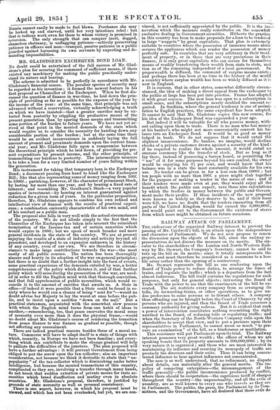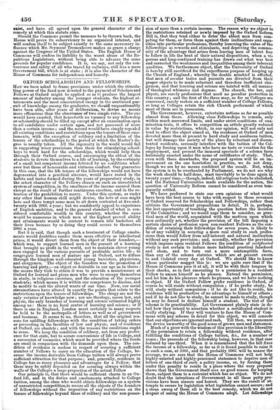RAILWAY ATTACK ON PARLIAMENT.
THE endeavour of the organized Railway interest to prevent the
passing of Mr. Cardwell's bill, is an attack upon the independence and character of Parliament. We do not now propose to renew the discussion upon the objects of the bill, since the railway re- presentatives do not discuss the measure on its merits. The cir- cular to the shareholders of the London and North-Western Rail- way by Mr. Stewart, the Company's Secretary, cannot be said to take up the bill on its merits ; since it totally misrepresents the project, and must therefore be considered as a summons to a hos- tile array rather than the opening of a controversy. Mr. Stewart represents the bill as one conferring upon the Board of Trade power to reduce duties, to arrange the times of trains, and regulate the traffic ; which is a departure from the fact almost ludicrous. The bill itself contains the regulations for such purposes, but only for general objects ; intrusting the Board of Trade with the power to see that the enactments of the bill be ex- ecuted. The act restricts every company from so arranging its tolls, its forwarding-trains, or other operations, as to give un- due preference to some persons or to thwart others. A company thus offending can be brought before the Court of Chancery by any persons who are injured, and then the Board of Trade possesses a summary authority for giving redress. But it is evident that such a power of intervention constitutes nothing resembling the right ascribed to the Board, of reducing tolls or regulating traffic ; and when the Secretary of the North-Western Company calls upon the shareholders to accept that view, and to put a pressure upon their representatives in Parliament, he cannot mean so much " to pro- cure an examination" of the bill, as a hinderance or mutilation.
This resistance will put Parliament upon its trial. The Railway interest possesses very great wealth ; the officer of whom we are speaking boasts that its property amounts to 300,000,0001. ; by its very nature it is organized ; and those who are most interested in maintaining its influence and securing its monopoly of traffic are precisely the directors and their suite. Thus it can bring concen- trated influence to bear against influences not concentrated. The case is so well understood, that no refinement, no dispute
about details, can materially alter the general merits. The im- policy of competing enterprises—the mismanagement of the traffic generally—the public inconvenience produced by conflict, where there should be cooperation—the capricious tariff of charges throughout the country—the unpunctuality, and all the evils of unsafety, are as well known to every one who travels as they are in Parliament. The public, the press, the Parliament by its Com- mittees, and the Government, have all declared that these evils do
szist, and have all agreed upon the general character of the remedy at which this statute aims. Should the Commons permit the measure to be thrown back, the House will prove its subserviency to an organized interest, and will confess itself to be subject exaotly to the same mercenary in- fluence which Mr. Seymour Tremenheere makes so grave a charge against the Congress of the United States. The English House of Commons will confess its liability to the worst abuse of the Re- publican Legislature, without being able to advance the same grounds for popular confidence. It is, we say, not only the con- venience and safety of all who travel by railways, still less a mere Government bill, which is at stake ; it is also the character of the House of Commons for independence and honesty.



























 Previous page
Previous page